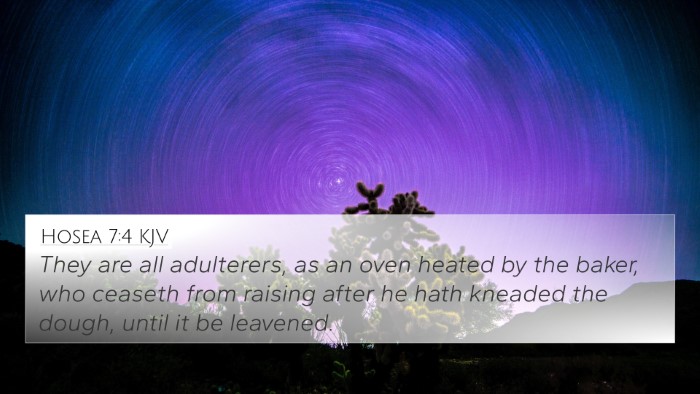Understanding Proverbs 6:27
Verse: "Can a man take fire in his bosom, and his clothes not be burned?" (Proverbs 6:27, KJV)
This verse serves as a profound metaphor about temptation and the consequences of sin. At its core, it reflects on the inherent danger of engaging with sin and the likelihood of suffering damage as a result.
Verse Meaning and Context
The verse is part of a larger discourse in the Book of Proverbs, which is a collection of wisdom sayings attributed primarily to King Solomon. This particular chapter warns against the allure of adultery and the ruinous path that one may embark upon if proper caution is not exercised.
Commentary Insights
Matthew Henry's Commentary: Matthew Henry emphasizes the impulsive nature of sin, likening it to taking fire. Just as one cannot touch fire without sustaining burns, so too will one face repercussions when entangled in sinful actions. He warns of the folly of believing one can engage with sin without consequences, highlighting the metaphorical 'burn' one experiences when straying from God's path.
Albert Barnes' Notes: Barnes elaborates on the idea that this verse illustrates the dangers inherent in temptation. He draws connections to physical and spiritual perils, suggesting that just as a person will inevitably burn if they hold fire close, so too will a person suffer if they flirt with temptation without caution. He argues that wisdom involves recognizing and avoiding situations that may lead to moral failure.
Adam Clarke's Commentary: Clarke discusses the rhetorical style of the proverb, noting that it serves to provoke thought about the wisdom of avoiding dangerous situations. He posits that the message is not merely about adultery but about a broader spectrum of sinful behaviors. Clarke also emphasizes the need for vigilance against indulgences that may seem harmless at first glance.
Bible Cross-References
Proverbs 6:27 relates to several other scripture passages, offering a deeper understanding of its teachings:
- James 1:14-15: "But every man is tempted, when he is drawn away of his own lust, and enticed. Then when lust hath conceived, it bringeth forth sin: and sin, when it is finished, bringeth forth death."
- Galatians 6:7: "Be not deceived; God is not mocked: for whatsoever a man soweth, that shall he also reap."
- Proverbs 4:23: "Keep thy heart with all diligence; for out of it are the issues of life."
- Romans 6:23: "For the wages of sin is death; but the gift of God is eternal life through Jesus Christ our Lord."
- 1 Corinthians 10:12: "Wherefore let him that thinketh he standeth take heed lest he fall."
- 2 Timothy 2:22: "Flee also youthful lusts: but follow righteousness, faith, charity, peace, with them that call on the Lord out of a pure heart."
- Proverbs 13:15: "Good understanding giveth favor: but the way of transgressors is hard."
Thematic Connections
This verse, when examined alongside its cross-references, showcases a common biblical theme: the inevitability of consequences arising from immoral actions. The connections elucidate the overarching message that a prudent life is one that actively avoids temptation and embraces the teachings of wisdom found throughout the scriptures.
Practical Applications
In light of Proverbs 6:27, believers are encouraged to:
- Avoid situations that may lead them into temptation or moral compromise.
- Engage in regular self-reflection and assessment of one's desires and motivations.
- Seek accountability and support within their faith community to resist temptation.
Conclusion
Proverbs 6:27 serves as a timeless reminder of the spiritual truths regarding temptation and sin. By understanding the implications of this verse and its connections to other scriptures, believers can better navigate the complexities of moral choices in their lives. The collective wisdom of biblical teachings reinforces the notion that wise choices lead to life, while careless indulgences often result in hardship and suffering.





